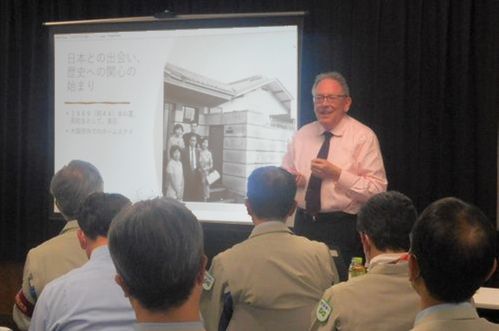No.088 - Lecture by Professor Andrew Gordon at Kuraray’s Kurashiki Plant
Lecture by Professor Andrew Gordon at Kuraray’s Kurashiki Plant
Professor Andrew Gordon, who is the Lee and Juliet Folger Fund Professor of History at Harvard University, USA, was awarded the second NIHU International Prize in Japanese Studies in 2020. During his recent visit to Japan, with the support of the Kuraray Foundation, Professor Gordon visited Kuraray Co., Ltd.’s Kurashiki Plant to give a lecture to its employees. In this issue, we will report on his lecture.
At the beginning of his lecture, entitled “The Attractions and Challenges of Modern Japan as Seen by an Overseas Historian,” Professor Gordon explained how he stayed in Japan as a high school student and developed his interest in the country through homestays and factory tours. In particular, his experiences at Japanese factories became his number one reason for later choosing the history of labor relations in Japan as the theme for his research when studying for his doctorate at graduate school. Regarding the first attraction of modern Japanese history, including this research theme, Professor Gordon says, “Japanese modern history can be considered in terms of both its uniqueness and its common characteristics with modern world history.” The second attraction, he says, is the Meiji Restoration, which was an era of very rapid change, such as the change of transportation from hikyaku (human couriers) to railways at a very rapid pace. On the other hand, Professor Gordon explained the fact that there were also periods of slow change—such as changes in the roles of men and women in housework and childcare—as both a mystery and a third attraction.
With regard to challenges in modern Japanese history, Professor Gordon pointed out that when the present changes, or when modern people’s awareness of problems changes, the object that should be examined also changes. As one example of this, in his book A Modern History of Japan: From Tokugawa Times to the Present, the first edition of which was published in 2003, there was little mention of disasters, particularly of earthquakes and tsunamis, in Japan. So, in preparation for the publication of the third edition in 2014 (Japanese translation title: “200 Years of Japan: From Tokugawa Times to the Present”), he focused on disasters from the Edo period to the 2011 Great East Japan Earthquake. The second challenge, he said, is the importance of facing up to the “inconvenient” aspects of modern Japanese history, such as imperialism and war.

After the lecture, there was a Q&A session and an exchange of opinions between Professor Gordon and the plant employees. Topics began with a comment on “200 Years of Japan,” and went on to cover a wide range of topics—including recent international affairs, the significance of learning history, changes in the employment systems of Japan including a sense of belonging and work-life balance within companies, the causal relationship between the traditional awareness of Japan as a mono-ethnic country and its system for accepting immigrants from overseas, differences in ways of thinking between Japan and other countries, and the appeals and attractions of Japan from his perspective.
Text: OHBA Go, Research Fellow, the Center for Innovative Research, the National Institutes for the Humanities
